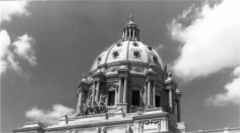|
Quotations for Judges
Copyright (c) 2000 Burton Randall Hanson (Original Content Only)
 "As Professor Chafee remarked concerning the opposition to the appointment of Mr. Hughes as Chief Justice, it is less revealing to examine the list of clients in the nominee's office than to investigate the books in his library." Paul A. Freund, "Umpiring the Federal System," 54 Columbia L. Rev. 561, 574 (1954). Below are some of my favorite quotations on law and justice. I will add more during the course of the campaign.These quotations reflect some of my reading. I like to browse in used bookstores and often buy and read books that seemingly are on nonlegal topics. Reading all sorts of books is a good way to keep one's mind fresh and open. On the theory that all truth is related, I often find that something said in a book of poetry or letters or a novel or a book of psychology provides me with new metaphors for use in legal analysis and writing. "As Professor Chafee remarked concerning the opposition to the appointment of Mr. Hughes as Chief Justice, it is less revealing to examine the list of clients in the nominee's office than to investigate the books in his library." Paul A. Freund, "Umpiring the Federal System," 54 Columbia L. Rev. 561, 574 (1954). Below are some of my favorite quotations on law and justice. I will add more during the course of the campaign.These quotations reflect some of my reading. I like to browse in used bookstores and often buy and read books that seemingly are on nonlegal topics. Reading all sorts of books is a good way to keep one's mind fresh and open. On the theory that all truth is related, I often find that something said in a book of poetry or letters or a novel or a book of psychology provides me with new metaphors for use in legal analysis and writing.
"Fill the seats of justice with good [people], not so absolute in goodness as to forget what human frailty is...." Sir Thomas Noon Talfourd
"If you don't notice the umpire, he's doing a good job." Baseball saying.
"It is important not to give the appearance of a predisposed mind. And it is more important not to let the mind become predisposed." Felix Frankfurter, Of Law and Men viii. (1956).
"To embarrass justice by a multiplicity of laws, or to hazard it by reliance on judges, are the opposite rocks on which all civil institutions have been wrecked." Johnson (engraved on wall of Minnesota State Capitol outside the Supreme Court Courtroom)
"Let every man make known what kind of government would command his respect, and that will be one step towards obtaining it." Henry David Thoreau
"If you state a moral case to a plowman and a professor, the farmer will decide it as well, and often better, because he has not been led astray by any artificial rules." Thomas Jefferson
"[L]aw [is] one of the most central of all the liberal arts. The law can be highly technical; it is obviously practical and professional in its applications. But it is also rooted in the most fundamental of all human inclinations: the desire to discover and bring reasonable and fair order into our lives and behavior. It is enmeshed with all those complicated impulses that make us want to estimate or judge things accurately, while simultaneously wanting to make due allowance for extenuating circumstances, for inevitable doubt, for the simple desire to pardon and forgive as well as to fix blame or seek retribution. In these and other ways, the law requires not only knowledge and the ability to reason or argue rigorously. It demands those other capacities -- not so easily categorized or taught -- as insight, intuition, wisdom, and courage. In short, it is intensely human, touching on everything that is essential to our lives, and quintessential to the liberal arts." Neil L. Rudenstine, President, Harvard University
"The primary work of the appellate court is not creative or even particularly intellectual. The personal quality most required for the work is not intellect but care. Care is what is required to read tiresome transcripts and to listen to tedious arguments based on the details of the record in order to ascertain whether a trial judge has strayed from the true path of the law so far as to rest a decision on a clearly erroneous factual determination. Or whether an administrative agency has committed a substantial error 'on the whole record' before it. The importance of this work has been sadly underestimated. It is the essence of the idea of a government of law." Paul Carrington, "Ceremony and Realism: Demise of Appellate Procedures, 66 A.B.A. Bar J. 860 (1980).
"From the standpoint of the judiciary, there are two sides to the shield of the doctrine of separation of powers. It is essentially the province of judges to know what the law is, but judges should not undertake nonjudicial jobs." Thomas Reed Powell, Vagaries and Varieties in Constitutional Interpretation 25 (1956).
"In the 18th century Alexander Pope could write: 'Of all those ills that mortal men endure/ How few are those the law can cause or cure.'...Consider the great issues of our time: war and peace, poverty and plenty, consumption and conservation of resources, ignorance and education, fear and security in our crowded cities. The law, and particularly judge-made law, can have only a limited impact on these issues....The law can give us freedom from governmental censorship of the press, but the quality of the press, its contribution to our understanding and our will, lies in larger measure with the press itself. Thus, responsibility rather than freedom of the press becomes the problematic factor. The same is true of those immensely powerful media, television and motion pictures." Paul A. Freund, "The Judicial Process in Civil Liberties Cases," 1975 U. Ill. L. F. 494.
"To make a government requires no great prudence....To give freedom is still more easy....But to form a free government; that is, to temper together these opposite elements of liberty and restraint in one consistent work, requires much thought...." Edmund Burke, Reflections on the Revolution in France (1790)
"A wise old woman will make decisions in about the same way as a wise old man." Justice Mary Jeanne Coyne (quoted frequently by Justices Sandra Day O'Connor and Ruth Bader Ginsburg)
"Society is indeed a contract...a partnership.... As the ends of such a partnership cannot be obtained in many generations, it becomes a partnership not only between those who are living, but between those who are living, those who are dead, and those who are yet to be born." Edmund Burke, Reflections on the Revolution in France (1790)
"Liberty lies in the hearts of men and women; when it dies there, no constitution, no law, no court can save it; no constitution, no law, no court can even do much to help it. While it lies there it needs no constitution, no law, no court to save it. And what is this liberty which must lie in the hearts of men and women? It is not the ruthless, the unbridled will; it is not freedom to do as one likes. That is the denial of liberty, and leads straight to its overthrow. A society in which men recognize no check upon their freedom soon becomes a society where freedom is the possession of only a savage few; as we have learned to our sorrow. What then is the spirit of liberty? I cannot define it; I can only tell you my own faith. The spirit of liberty is the spirit which is not too sure that it is right; the spirit of liberty is the spirit which seeks to understand the minds of other men and women; the spirit of liberty is the spirit which weighs their interests alongside its own without bias; the spirit of liberty remembers that not even a sparrow falls to earth unheeded; the spirit of liberty is the spirit of Him who, near two thousand years ago, taught mankind that lesson it has never learned, but has never quite forgotten; that there may be a kingdom where the least shall be heard and considered side by side with the greatest." Learned Hand, The Spirit of Liberty 190 (1952).
"'It is this backward motion toward the source,/ Against the stream, that most we see ourselves in,/ The tribute of the current to the source,/ It is from this in nature we are from./ It is most us." Robert Frost, "West-Running Brook."
Copyright (c) 2000 by Burton Randall Hanson - Prepared & published by candidate on his own behalf and at his own expense. Candidate may be reached by e-mail at BRH@CampaignWebSiteURL or by mail at address listed on Secretary of State's website.
|

 "As Professor Chafee remarked concerning the opposition to the appointment of Mr. Hughes as Chief Justice, it is less revealing to examine the list of clients in the nominee's office than to investigate the books in his library." Paul A. Freund, "Umpiring the Federal System," 54 Columbia L. Rev. 561, 574 (1954). Below are some of my favorite quotations on law and justice. I will add more during the course of the campaign.These quotations reflect some of my reading. I like to browse in used bookstores and often buy and read books that seemingly are on nonlegal topics. Reading all sorts of books is a good way to keep one's mind fresh and open. On the theory that all truth is related, I often find that something said in a book of poetry or letters or a novel or a book of psychology provides me with new metaphors for use in legal analysis and writing.
"As Professor Chafee remarked concerning the opposition to the appointment of Mr. Hughes as Chief Justice, it is less revealing to examine the list of clients in the nominee's office than to investigate the books in his library." Paul A. Freund, "Umpiring the Federal System," 54 Columbia L. Rev. 561, 574 (1954). Below are some of my favorite quotations on law and justice. I will add more during the course of the campaign.These quotations reflect some of my reading. I like to browse in used bookstores and often buy and read books that seemingly are on nonlegal topics. Reading all sorts of books is a good way to keep one's mind fresh and open. On the theory that all truth is related, I often find that something said in a book of poetry or letters or a novel or a book of psychology provides me with new metaphors for use in legal analysis and writing.